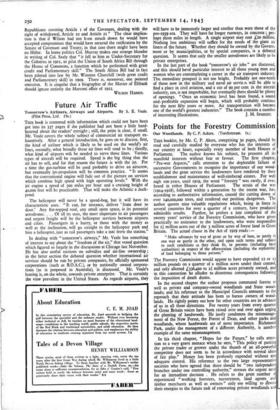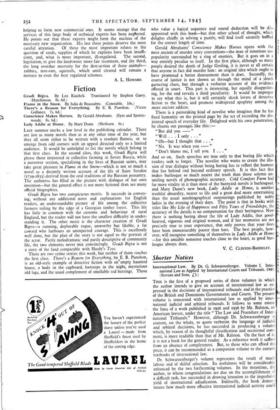Points for the Forestry Commission
Our Woodlands. By C. P. Ackers. (Torchstream. Is.) THIS booklet, by Mr. C. P. Akers, comprising 30 pages, should be read and carefully studied by everyone who has the interests of our country at heart, especially every member of both Houses of
Parliament. The author knows his subject, he presents all its manifold interests without fear or favour. The first chapter, "Pre-war Aspects," calls attention to the deplorable failure of successive Governments to recognise the importance of our wood- lands and the great service the landowners have rendered by their establishment and maintenance of well-timbered estates. For well nigh roo years, until 1919, the word " forestry " was rarely, if ever, heard in either Houses of Parliament. The strain of the war (1914-1918), followed within a generation by the recent war, has, according to authoritative information, caused the cutting down of over 14o,00o,000 trees, and rendered our position dangerous. The author quotes nine valuable regulations which, being in force in several countries for over a quarter of a century, have produced admirable results. Further, he prefers a just complaint of the twenty years' service of the Forestry Commission, who have given practically no assistance to the landowners, who were responsible for 2-1 million acres out of the 3 million acres of forest land in Great Britain. The actual clause in the Act of 1919 reads :— " Make advances by way of grant or by way of loan, or partly in one way or partly in the other, and upon such terms and subject to such conditions as they think fit, to persons (including local authorities) in respect of the afforestation (including the replanting) of land belonging to those persons."
The Forestry Commission would appear to have expended 12 or 13 million pounds on a quarter of a million acres under their control, and only allotted L336,420 to 2.1 million acres privately owned, and in this connection he alludes to disastrous consequences following the imposition of death duties.
In the second chapter the author proposes communal forests as well as private and company-owned woodlands and State wood- lands; and his reference to the Municipal Councils amounts to the reproach that their attitude has been to harass owners of wood- lands. He rightly points out how far other countries are in advance of us in all these directions. For twenty years from every quarter of Great Britain voices have been raised over and over again urging the planting of hardwoods. He justly condemns the mismanage- ment of the New Forest, the Forest of Dean, and other parks and woodlands, where hardwoods are of most importance. Richmond Park, under the management of a different Authority, is another example of the same mismanagement.
In his third chapter, "Hopes for the Future," he calls atten- tion to a very grave menace when he says, "This policy of putting the private trader or grower under the thumb of an all-powerful competitor does not seem to be in accordance with normal ideas of fair play." Money has been profusely expended without any adequate control. His reference to the two large representative societies who have agreed that there should be "two independent branches under one controlling authority," stresses the urgent need for an immediate decision . He refers to the great number of experienced "working- foresters, nurserymen, land agents and timber merchants as well as owners" only too willing to devote their energies to the future task of renovating private woodlands and
helping to form new commercial ones. It seems strange that the services of this large body of technical experts has been negtected. He points out that these experts might form the nucleus of the necessary new organisation. His last three points deserve the most careful attention. Of these the most important relates to the question of seeds, supplies of which he explains have been insuffi- cient, and, what is more important, ill-regulated. The second, legislation, to give the landowner more fair treatment, and the third, the long overdue necessity for the destruction of those animals— rabbits, tree-rats, squirrels, which until cleared will remain a menace to even the best regulated schemes.
A. L. HOWARD.



























 Previous page
Previous page